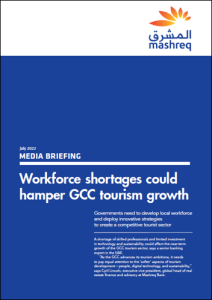Workforce shortages could hamper GCC tourism growth

Governments need to invest in developing local talent and deploy innovative strategies to create a competitive tourist sector, says Mashreq Bank
- The GCC’s tourism sector could face a shortfall in skilled professionals
- Hotels and resorts are the most active projects under contract in the GCC tourism industry, according to MEED Projects
- Nearly 90,000 skilled professionals are needed in the hospitality sector by 2026
- Markets including the UAE and Saudi Arabia will see most demand for manpower, based on existing and planned developments
- Training and upskilling of staff is necessary to remain competitive
- Investing in innovative technology and sustainable practices can create a more resilient, future-proofed industry
Download the latest insights from Mashreq here
A shortfall in skilled professionals could affect the GCC’s status as a global tourism hub, according to a senior banking expert in the UAE.
“As the GCC advances on its tourism ambitions, it needs to pay equal attention to the ‘softer’ aspects of development – people, technology, and sustainability,” says Cyril Lincoln, executive vice president, global head of real estate finance and advisory at Mashreq Bank.
Lincoln’s comments are particularly critical given the huge number of new investments in the sector.
In the GCC alone, there are more than $143bn worth of leisure and hospitality projects planned and under construction, according to data from projects tracking service MEED Projects.
Nearly $28bn of this total is already under construction, including developments such the Guggenheim Abu Dhabi Museum in the UAE; Saudi Arabia’s King Salman Park Royal Arts Complex; the Six Flags Theme Park in Riyadh; and luxury hotel projects by the likes of The Red Sea Development Company and Katara Hospitality.
The future pipeline of projects is considerable. Over $115bn worth of tourism projects are in various pre-execution stages, indicative of the expected rise in demand for skilled labour.
“The challenge now is not the absence of opportunity, but perhaps the lack of manpower and technical skillsets,” says Lincoln. “Covid-19 sparked unemployment across travel and tourism not just in the region, but globally. As the industry recovers, there are clear indications of pent-up demand – but not all workers may choose to return.”
Hospitality leads the way
The majority of leisure and hospitality projects planned and underway in the GCC are hotels and resorts. MEED Projects reports that $13bn worth of hotel and resort projects are currently underway in the GCC, and nearly 45 per cent of these are in Saudi Arabia, as it seeks to establish itself as a major tourist destination.
Real estate service provider Colliers identifies that the GCC will require more than 90,000 skilled professionals in its hospitality sector by 2026, of which nearly 86,000 will be needed in the UAE and Saudi Arabia.
The number is expected to grow bearing in mind the considerable projects pipeline.
“The projects market is a reflection of how important the tourism sector is to the GCC governments,” says Lincoln. “It is seen as a contributor to national incomes, as well as a means for a country’s brand building.”
But even as stability returns to the industry, Lincoln states that more needs to be done in terms of the efficiency of recovery.
“As the industry regains its strength, it needs to ensure it is actively investing in more than just projects – it needs to bring back its people, while also futureproofing.”
 Lincoln sees training and retaining talent as an equally important part of the process, which countries such as the UAE are enabling through policy changes and visa reforms. He further emphasises the need to create a balance between local and expatriate manpower in the sector.
Lincoln sees training and retaining talent as an equally important part of the process, which countries such as the UAE are enabling through policy changes and visa reforms. He further emphasises the need to create a balance between local and expatriate manpower in the sector.
“Governments need to drive the development of local capabilities, and this can be done by establishing relevant training institutes and university programmes. This further aligns with the vision to establish a knowledge-based economy, while also creating business opportunities for international educators in the field.”
Read more in-depth insights from Mashreq
This briefing is brought to you by the MEED-Mashreq Real Estate Partnership.



